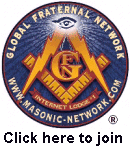
The GFN Treasure Chest Archives
www.masonic-network.com
"Where Master Masons Communicate"

 |
The GFN Treasure Chest Archiveswww.masonic-network.com |
 |
Solomon. In writing the life of King Solomon from a Masonic point of view, it is impossible to omit a reference to the legends which have been preserved in the Masonic system.
But the writer, who, with this preliminary notice, embodies them in his sketch of the career of the wise King of Israel, is by no means to be held responsible for a belief in their authenticity. It is the business of the Masonic biographer to relate all that has been handed down by tradition in connection with the life of Solomon; it will be the duty of the severer critic to seek to separate out of all these materials that which is historical from that which is merely mythical, and to assign to the former all that is valuable as fact, and to the latter all that is equally valuable as symbolism. . . . King Solomon commenced the erection of the Temple on Monday, the second day of the Hebrew month Zif, which answers to the twenty-first of April, in the year of the world 2992, and 1012 years before the Christian era. Advised in all the details, as Masonic tradition informs us, by the wise and prudent counsels of Hiram, King of Tyre, and Hiram Abif, who, with himself, constituted at that time the three Grand Masters of the Craft, Solomon made every arrangement in the disposition and government of the workmen, in the payment of their wages, and in the maintenance of concord and harmony which should insure despatch in the execution and success in the result. To Hiram Abif was entrusted the general superintendence of the building, while subordinate stations were assigned to other eminent artists, whose names and offices have been handed down in the traditions of the Order.
In short, the utmost perfection of human wisdom was displayed by this enlightened monarch in the disposition of everything that related to the construction of the stupendous edifice. Men of the most comprehensive minds, imbued with the greatest share of zeal and fervency, and inspired with the strongest fidelity to his interests, were employed as masters to instruct and superintend the workmen; while those who labored in inferior stations were excited to enthusiasm by the promise of promotion and reward. The Temple was at length finished in the month Bul, answering to our November, in the year of the world 3000, being a little more than seven years from its commencement. . . . That King Solomon was the wisest monarch that swayed the scepter of Israel, has been the unanimous opinion of posterity. So much was he beyond the age in which he flourished, in the attainments of science, that the Jewish and Arabic writers have attributed to him a thorough knowledge of the secrets of magic, by whose incantations they suppose him to have been capable of calling spirits and demons to his assistance; and the Talmudists and Mohammedan doctors record many fanciful legends of his exploits in controlling these ministers of darkness. As a naturalist, he is said to have written a work on animals of no ordinary character, which has, however, perished; while his qualifications as a poet were demonstrated by more than a thousand poems which he composed, of which his epithalamium on his marriage with an Egyptian princess and the Book of Ecclesiastes alone remain.
He has given us in his Proverbs an Opportunity of forming a favorable opinion of his pretensions to the character of a deep and right-thinking philosopher; while the long peace and prosperous condition of his empire for the greater portion of his reign, the increase of his kingdom in wealth and refinement, and the encouragement which he gave to architectures the mechanic arts, and commerce, testify his profound abilities as a sovereign and statesman- After a reign of forty years he died, and with him expired the glory and the power of the ancient Hebrew Empires.
Roger Bacon, Opus Majus:
Solomon, who was wiser than all who preceded him and all who followed, could not neglect these matters [secret knowledge], and therefore left many things written in an enigmatical form, which later by the magi were turned to evil uses and were interpreted in the wrong way, in which have been mingled many hideous things by fraudulent people. But the wise know how to separate the grains from the chaff and the antidote from the serpent.
Francis Bacon, New Atlantis:
"And here I shall seem a little to digress, but you will by and by find it pertinent. Ye shall understand, my dear friends, that among the excellent acts of that King, one above all hath the pre-eminence. It was the erection and institution of an order, or society, which we call Saloman's House, the noblest foundation, as we think, that ever was upon the earth, and the lantern of this kingdom. It is dedicated to the study of the works and creatures of God. Some think it bearteth the founder's name a little corrupted, as if it should be Solomon's House. But the records write it as it is spoken. So as I take it to be denominate of the King of the Hebrews, which is famous with you, and no strangers to us; for we have some parts of his works which with you are lost; namely that natural history which he wrote of all plants, form the cedar of Libanus to the moss that groweth out of the wall; and of all things that have life and motion. This maketh me think that our King finding himself to symbolize, in many things, with that King of the Hebrews, which lived many years before him, honored him with the title of this foundation."
Albert Pike, Morals and Dogma:
The Ritual of the Degree of Kabalistic and Hermetic Rose +, has these passages: The true Philosophy, known and practiced by Solomon, is the basis on which Masonry is founded. Our Ancient Masons have concealed from us the most important point of this Divine Art, under hieroglyphical characters, which are but enigmas and parable, to all the Senseless, the Wicked, and the Ambitious. He will be supremely fortunate, who shall, by arduous labor, discover this sacred place of deposite, wherein all naked the sublime Truth is hidden; for he may be assured that he has found the True Light, the True Felicity, the True Heavenly Good. Then may it truly be said that he is one of the True Elect.
Manly Hall, Secret Teachings of All Ages:
The best-informed Masonic writers have realized that Solomon's Temple is a representation in miniature of the Universal Temple. . . . Solomon, the Spirit of Universal Illumination mental, spiritual, moral and physical is personified in the king of an earthly nation. While a great ruler by that name may have built a temple, he who considers the story solely from its historical angle will never clear away the rubbish that covers the secret vaults. The rubbish is interpolated matter in the form of superficial symbols, allegories, and degrees which have no legitimate part in the original Freemasonic Mysteries.
Finkelstein and Silberman, David and Solomon, ISBN-13: 978-0-7432-4362-9 (2006):
The story of David and Solomon's establishment of a powerful, prosperous United Monarchy of Israel has provided a model of Righteous leadership enshrined in the Judeo-Christian tradition and in every society that has drawn its moral authority from it. . . . Upon his death David is succeeded by Solomon, his son by the beautiful Bathsheba, who rules the kingdom wisely and ushers in an era of peace and prosperity. . . . Solomon goes on to build a magnificent Temple in Jerusalem and reigns with justice and intelligence, over a vast bureaucracy, a mighty army and a great people. Through his international connections and skill in trade and diplomacy, Solomon is celebrated throughout the world as the richest and wisest of kings. . . . Solomon's image is the ideal convergence of wisdom, opulence, and power in the person of a king. Indeed, Solomon’s rule in Jerusalem is a moment when the divine promise comes to its most tangible fulfillment; his reign is a golden age of prosperity, knowledge, and power for all the people of Israel. Forever after, Solomon’s rule would be nostalgically recalled as a golden age of spiritual and material fulfillment that might, one day, be experienced again. . . . Even today, an age when western monarchy has passed away in all but its ceremonial trappings, the power of David and Solomon endures. . . . The biblical stories of David and Solomon offer a template for western leadership and an archetype of kingly power that influences each of us, consciously or not. . . . Understanding the process of the mythmaking about David and Solomon in no way questions the value of the tradition. . . . The figures of David and Solomon embody the foundations of the evolving civilization we live in, in its attempt to reconcile dreams of golden ages and ideal leaders with ever-changing political, social and religious realities.